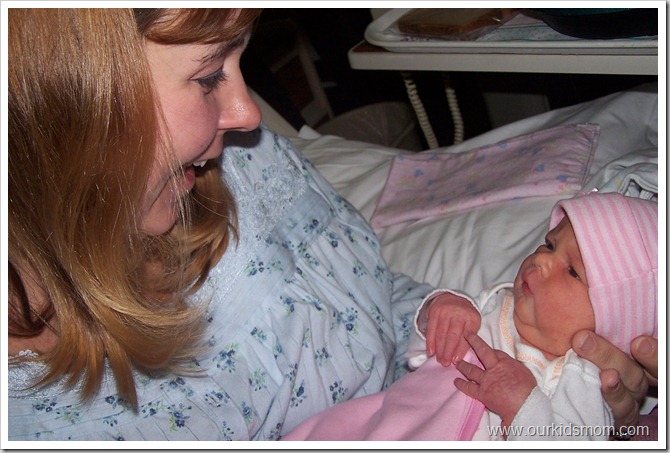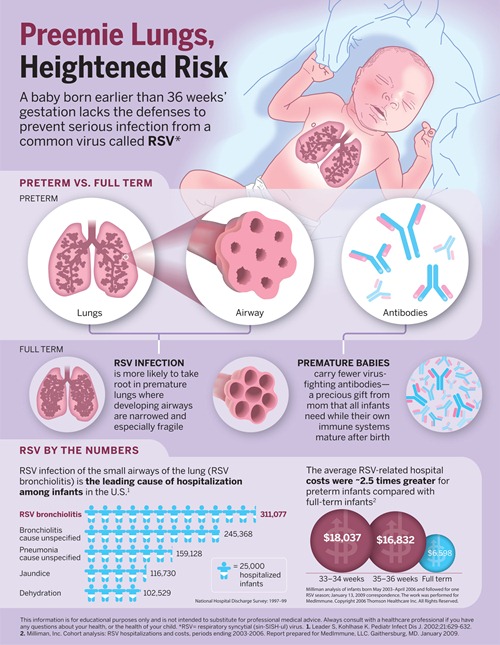National Prematurity Day was November 17. Did you know that 1,400 babies are born premature in the United States every day and 13 million babies are affected by prematurity around the world? Prematurity is defined as being born before 37 weeks gestation. Two of my children were “almost” premature… by one day. Josh and Emma were both born at 37 weeks. Although Josh was large for his gestation at 8 lbs 11 oz, Emma was tiny (and my smallest) at 7 lbs 5 oz. … she came home at around 6 lbs 9 oz. She was so small that even preemie clothes were big on her!
We were fortunate that both Josh and Emma didn’t have any complications with coming that early. At birth, preemies often have difficulty breathing, feeding and maintaining their body temperature. Their immune systems are not fully mature and they are much more likely to develop infections and highly susceptible to respiratory problems.
Nearly all babies contract RSV (respiratory syncytial virus) by the age of two. Most full-term babies develop similar symptoms to a common cold and their parents may not even realize their baby has the virus. Preterm infants are at an increased risk for developing RSV-related infections and oftentimes require medical attention or even hospitalization. Parents should speak with their pediatricians to find out if their baby is at high risk for developing RSV and how they can prevent it this winter.
RSV Quick Facts:
RSV is the leading cause of infant hospitalization, responsible for more than 125,000 hospitalizations and up to 500 infant deaths each year.
RSV occurs in epidemics each fall through spring. The CDC has defined “RSV season” as beginning in November and lasting through March for most parts of North America.
Certain regions have longer RSV seasons than others, with the season beginning as early as July (e.g., Florida) or ending in April.
Despite its prevalence, one-third of mothers have never heard of RSV.
Prevention is Key:  There is no treatment for RSV, so it’s important for parents to take the following preventive steps to help protect their child:
There is no treatment for RSV, so it’s important for parents to take the following preventive steps to help protect their child:
Wash hands, toys, bedding, and play areas frequently
Ensure you, your family, and any visitors in your home wash their hands or use hand sanitizer
Avoid large crowds and people who may be sick
Never let anyone smoke near your baby
Speak with your child’s doctor if you believe he or she may be at high risk for RSV, as a preventive therapy may be available
Be Aware of Symptoms:
Contact your child’s pediatrician immediately if your child exhibits one or more of the following:
Persistent coughing or wheezing
Rapid, difficult, or gasping breaths
Blue color on the lips, mouth, or under the fingernails
High fever
Extreme fatigue
Difficulty feeding
To learn more about RSV, visit www.rsvprotection.com. For more about the specialized health needs of preterm infants, visit www.preemievoices.com.
I wrote this review while participating in a blog tour by Mom Central Consulting on behalf of MedImmune and received a promotional item to thank me for taking the time to participate.


















Oh wow! My daughter was 7lbs 5oz, too. But she was born at 40 weeks and 1 day.
My friend’s daughter had RSV before. Poor babygirl was so sick 🙁 She was born at 5.5, and she’s still rather tiny at 2 years old.
One of my relatives had a premie baby with RSV. It was scarry, but he’s doing fine now. Thanks for sharing!
great information – thanks for sharing it.
My nephew was a preemie. He is now a 23 year old fire fighter and in good health! Your baby is very beautiful!
Thank you for the helpful information!! My cousin is expecting and this might help her out!! :0)